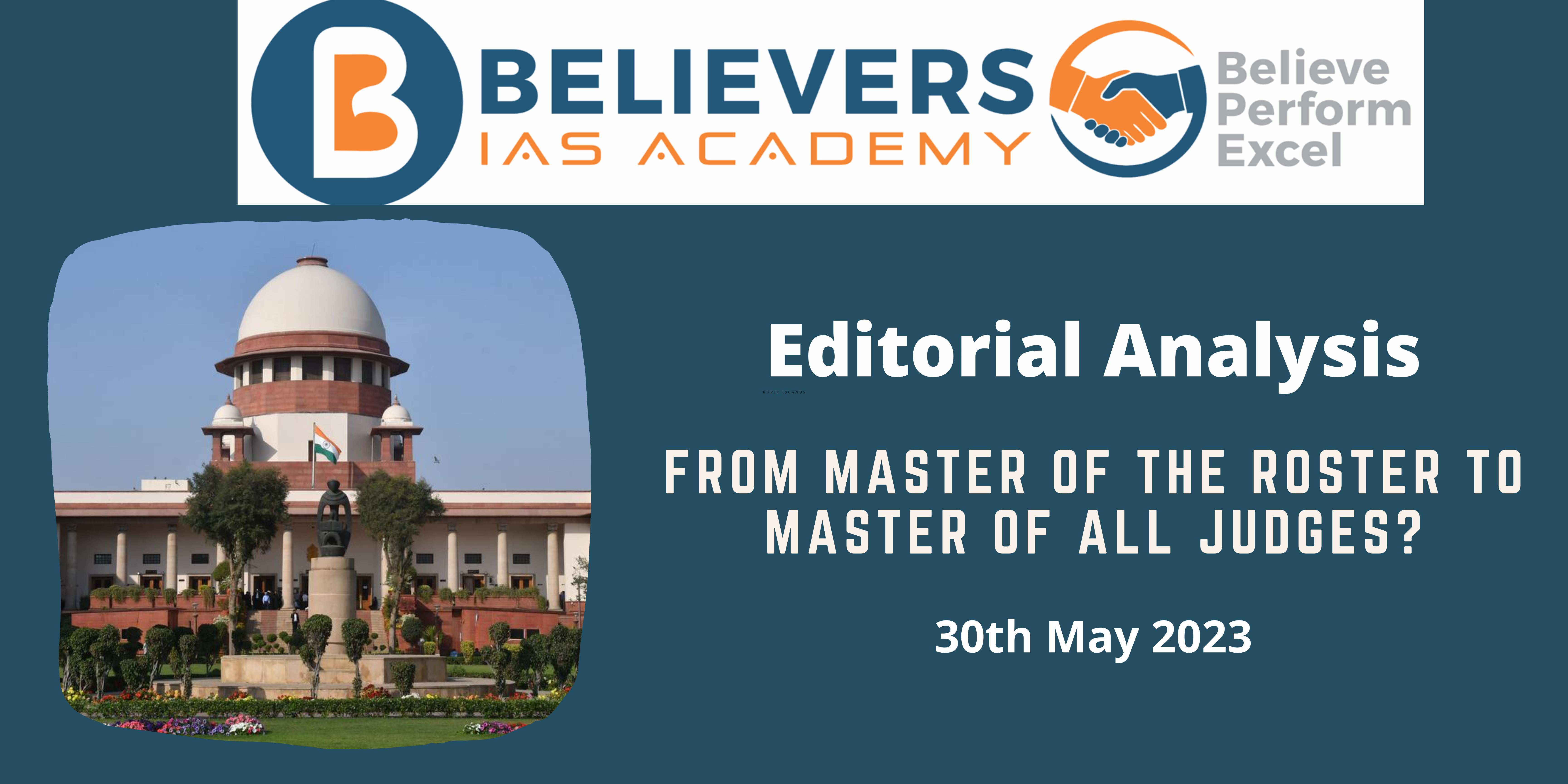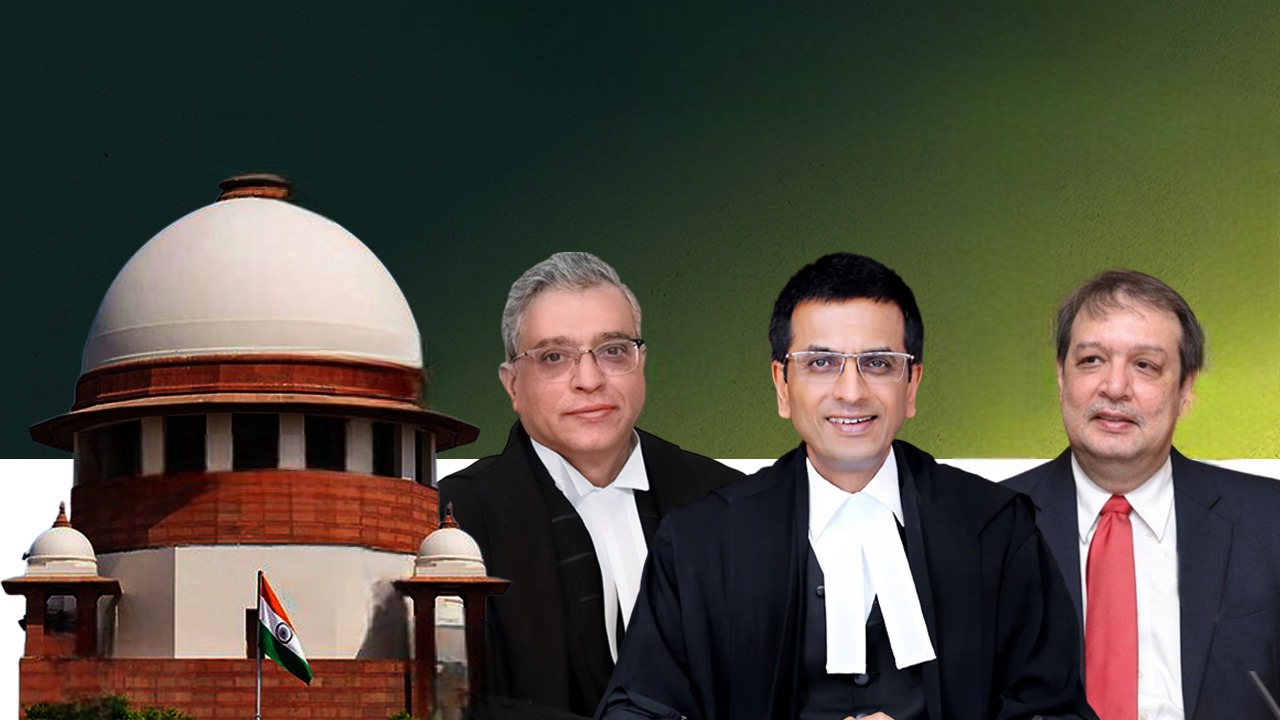From Master Of The Roster To Master Of All Judges?
Context:
In Ritu Chhabria v. Union of India, a Division Bench of the Supreme Court recently upheld the ability of an undertrial to be freed on default bail in the case that the inquiry is left unfinished and continues over the statutory deadline.
Ritu Chhabria judgment
- A recall request made by the Union of India against a particular judgement was taken into consideration by the Court of the Chief Justice of India (CJI). Recall applications are not frequently utilised as a legal remedy against a judgement, especially before a different bench, therefore this move is unique.
- Normally, the Union of India‘s only option would have been to submit a review petition. Usually, the same bench that rendered the initial judgement rules on review applications. Instead of considering a review petition in this instance, the Court of the CJI instead considered a recall application.
- A temporary order issued by the Court of the CJI instructed courts to consider bail requests without reference to the particular judgement under appeal (known as the “Ritu Chhabria” judgement). For a brief length of time, this interim decision deprived the Ritu Chhabria judgement of its precedential value.
- Even though it had no direct bearing on the initial verdict, the Court of the CJI tacitly suspended the impact of the Ritu Chhabria judgement by doing so. This shows that the Court of the CJI exercised its authority to stop the judgment’s application temporarily.
- The standard procedure for contesting a judgement is to submit a review petition to the same bench that rendered the original judgement. A well-established procedure for requesting a review of a judgement based on certain legal reasons is the filing of a review petition.
- It is unusual and raises concerns that the Court of the CJI is considering a recall application against a decision made by another court. This behaviour might be viewed as a deviation from standard legal procedures and as “bench fishing” or “forum shopping,” which refers to looking for a different judge or court to achieve a desired result.
- Normally, another court would have to be debating a related subject and disagree with the ruling in the Ritu Chhabria judgement for the Court of the CJI to step in and intervene in this way. The other bench may then send the situation to the Chief Justice of India for review by a bigger bench. However, none of these variables are included in the case you provided.
Master of the Roster
- Constitutional Equality: The judicial authority of each Supreme Court judge in India is equal. This indicates that each judge makes decisions regarding cases with an equal voice or power.
- Special Administrative Powers of the CJI: The Chief Justice of India (CJI) has particular administrative powers, including the ability to form benches and designate cases for further examination by a larger bench. These authorities pertain to the efficient operation of the court.
- The Chief Justice of India (CJI) is frequently referred to as the “Master of the Roster” because of their power to appoint benches and assign cases. The CJI’s administrative responsibility in overseeing the court’s workload is denoted by this phrase.
- Although the CJI has administrative authority, they are regarded as “first among equals” among their fellow judges. As a result, they have more administrative obligations than other judges, although they nevertheless have the same amount of voting authority.
- Minority Opinions: Throughout history, the CJI has occasionally written a minority opinion, suggesting that their opinions don’t always coincide with the court’s majority judgement. This emphasises, even more, the judges’ equal ability to vote.
- Different Systems in Commonwealth Countries: Commonwealth nations with similar systems in place include the United Kingdom, Australia, and Canada. Under these arrangements, judges sit together and have the authority to make decisions.
- Individual Benches in India: Instead of the court sitting in session, decisions in India are decided by individual benches. As a result, judgements take into account the particular strengths and makeup of the bench that was assigned to a given case.
- The power of the CJI in his or her capacity as the “Master of the Roster” has been the subject of discussion in India. Although the necessity of administrative decisions for the proper operation of the court has been upheld, questions remain regarding the scope of this power and whether certain measures go beyond what was originally intended.
- Potential System Misuse: The passage raises questions regarding the potential for “Master of the Roster” system misuse. It implies that, rather than going through the review process by the same bench, the government may ask the CJI to have a particular bench’s decision overturned if it is unhappy with it.
Cause for concern
- Abuse of Authority: The statement admits that the “Master of the Roster” system has served some administrative needs. However, it draws attention to the countless abuse cases that this system has documented. This suggests that some people, including the CJI, might have abused their authority when allocating cases to themselves or for other nefarious purposes.
- Senior Judges’ Allegations: The statement refers to a specific incident from five years ago in which four senior Supreme Court judges accused the administration and assignment of cases of serious flaws and irregularities. This indicates that concerns about the misuse of power within the ‘Master of the Roster’ system have been raised by credible sources within the judiciary itself.
- The statement acknowledges that the CJI has wide and unrestricted authority in his or her capacity as the Master of the Roster. This implies that the CJI has considerable latitude in deciding which cases go to which benches and managing the judicial system.
- The statement makes the case that restricting the CJI’s authority in his capacity as Master of the Roster is not realistic. It indicates that such powers are essential to the efficient operation of the court’s administrative system and that it would be difficult or impossible to try to limit them.
- Computerization of Case Assignments: According to the statement, the process of assembling benches and assigning cases should be entirely automated. This would eliminate human judgement from the process, including the CJIs. It implies that computerization would guarantee equity, and openness, and reduce the possibility of abuse or bias in case assignments.
Similar Topics:
SUPREME COURT VERDICT ON ECI APPOINTMENT





